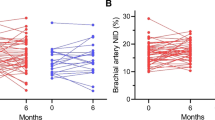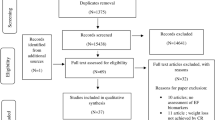Abstract
Obesity is associated with impaired endothelial function, and this may lead to increased cardiovascular risk. To gain insight into the beneficial effects of diet-induced weight loss on endothelial function, endothelium-dependent, flow-mediated dilation (FMD) of the brachial artery and several metabolic and inflammatory markers were assessed in 40 obese women (BMI 34.9 ± 4.88 kg/m2) at baseline, after the 1st week and after 5 months on a low-calorie diet of 5.0 MJ/day. Twenty lean women served as controls. At entry, the obese women had a lower FMD than the lean women (7.7 ± 1.8 vs. 11.5 ± 4.2%, p < 0.001). After 1 week of the intervention and 4% reduction of BMI, FMD improved by 22% (p = 0.005), and a decrease in circulating triglycerides, insulin, leptin, tissue type plasminogen activator and its inhibitor, von Willebrand factor, C-reactive protein and tumor necrosis factor receptor 1 was observed. Improvement of FMD was associated only with a decrease in BMI (r = 0.39, p = 0.03). Twenty-two women completed the weight reduction program and reduced their BMI by 16%. FMD was further improved by 64% (to 12.4 ± 5.3%, p = 0.001) and became comparable to that of lean women. None of the significant changes in the observed parameters was associated with improvement of FMD at the end of the program. Improvements in obesity-related endothelial dysfunction began in the 1st week of dieting and continued during the following months of this simple non-pharmacological lifestyle modification to reach normalisation of endothelial function. The favourable effect of dieting on endothelial function is independent of the accompanying improvement of classical risk factors.


Similar content being viewed by others
References
National Task Force on the Prevention, Treatment of Obesity (2000) Overweight, obesity and health risk. Arch Intern Med 160:898–904
Mavri A, Alessi MC, Juhan-Vague I (2004) Hypofibrinolysis in the insulin resistance syndrome: implication in cardiovascular diseases. J Intern Med 255:448–456
Poredos P (2001) Endothelial dysfunction in the pathogenesis of atherosclerosis. Clin Appl Thromb Haemost 7:276–280
Poredos P (2002) Endothelial dysfunction and cardiovascular disease. Pathophysiol Haemost Thromb 32:274–277
Simova I, Denchev S (2008) Endothelial functional and structural impairment in patients with different degrees of coronary artery disease development. Heart Vessels 23:308–315
Suwaidi JA, Hamasaki S, Higano ST, Nishimura RA, Holmes DR Jr, Lerman A (2000) Long-term follow-up of patients with mild coronary artery disease and endothelial dysfunction. Circulation 101:948–954
Schachinger V, Britten MB, Zeiher AM (2000) Prognostic impact of coronary vasodilator dysfunction on adverse long-term outcome of coronary heart disease. Circulation 101:1899–1906
Perticone F, Ceravolo R, Pujia A, Ventura G, Iacopino S, Scozzafava A, Ferraro A, Chello M, Mastroroberto P, Verdecchia P, Schillaci G (2001) Prognostic significance of endothelial dysfunction in hypertensive patients. Circulation 104:191–196
Steinberg HO, Chaker H, Leaming R, Johnson A, Brechtel G, Baron AD (1996) Obesity/insulin resistance is associated with endothelial dysfunction. Implications for the syndrome of insulin resistance. J Clin Invest 97:2601–2610
Arcaro G, Zamboni M, Rossi L, Turcato E, Covi G, Armellini F, Bosello O, Lechi A (1999) Body fat distribution predicts the degree of endothelial dysfunction in uncomplicated obesity. Int J Obes Relat Metab Disord 23:936–942
Hashimoto M, Akishita M, Eto M, Kozaki K, Ako J, Sugimoto N, Yoshizumi M, Toba K, Ouchi Y (1998) The impairment of flow-mediated vasodilatation in obese men with visceral fat accumulation. Int J Obes Relat Metab Disord 22:477–484
Fujii N, Tsuchihashi K, Sasao H, Eguchi M, Miurakami H, Hase M, Higashiura K, Yuda S, Hashimoto A, Miura T, Ura N, Shimamoto K (2008) Insulin resistance functionally limits endothelium-dependent coronary vasodilation in nondiabetic patients. Heart Vessels 23:9–15
Shimabukuro M, Higa N, Asahi T, Oshiro Y, Takasu N, Tagawa T, Ueda S, Shimomura I, Funahashi T, Matsuzawa Y (2003) Hypoadiponectinemia is closely linked to endothelial dysfunction in man. J Clin Endocrinol Metab 88:3236–3240
Selcuk H, Selcuk MT, Temizhan A, Maden O, Saydam GS, Ulupinar H, Dogan M, Aydin C, Topcu DI, Sasmaz A (2009) Decreased plasma concentrations of adiponectin in patients with slow coronary flow. Heart Vessels 24:1–7
Sciacqua A, Candigliota M, Ceravolo R, Scozzafava A, Sinopoli F, Corsonello A, Sesti G, Perticone F (2003) Weight loss in combination with physical activity improves endothelial dysfunction in human obesity. Diabetes Care 26:1673–1678
Hamdy O, Ledbury S, Mullooly C, Jarema C, Porter S, Ovalle K, Moussa A, Caselli A, Caballero AE, Economides PA, Veves A, Horton ES (2003) Lifestyle modification improves endothelial function in obese subjects with the insulin resistance syndrome. Diabetes Care 26:2119–2125
Ziccardi P, Nappo F, Giugliano G, Esposito K, Marfella R, Cioffi M, D’Andrea F, Molinari AM, Giugliano D (2002) Reduction of inflammatory cytokine concentrations and improvement of endothelial functions in obese women after weight loss over one year. Circulation 105:804–809
Brook RD, Bard RL, Glazewski L, Kehrer C, Bodary PF, Eitzman DL, Rajagopalan S (2004) Effect of short-term weight loss on the metabolic syndrome and conduit vascular endothelial function in overweight adults. Am J Cardiol 93:1012–1016
Raitakari M, Ilvonen T, Ahotupa M, Lehtimaki T, Harmoinen A, Suominen P, Elo J, Hartiala J, Raitakari OT (2004) Weight reduction with very-low-caloric diet and endothelial function in overweight adults: role of plasma glucose. Arterioscler Thromb Vasc Biol 24:124–128
Sasaki S, Higashi Y, Nakagawa K, Kimura M, Noma K, Sasaki S, Hara K, Matsuura H, Goto C, Oshima T, Chayama K (2002) A low-calorie diet improves endothelium-dependent vasodilation in obese patients with essential hypertension. Am J Hypertens 15:302–309
Mavri A, Stegnar M, Krebs M, Sentocnik JT, Geiger M, Binder BR (1999) Impact of adipose tissue on plasma plasminogen activator inhibitor-1 in dieting obese women. Arterioscler Thromb Vasc Biol 19:1582–1587
Matthews DR, Hosker JP, Rudenski AS, Naylor BA, Treacher DF, Turner RC (1985) Homeostasis model assessment: insulin resistance and beta-cell function from fasting plasma glucose and insulin concentrations in man. Diabetologia 28:412–419
Chauhan A, Mullins PA, Taylor G, Petch MC, Schofield PM (1997) Both endothelium-dependent and endothelium-independent function is impaired in patients with angina pectoris and normal coronary angiograms. Eur Heart J 18:60–68
Williams IL, Wheatcroft SB, Shah AM, Kearney MT (2002) Obesity, atherosclerosis and the vascular endothelium: mechanisms of reduced nitric oxide bioavailability in obese humans. Int J Obes Relat Metab Disord 26:754–764
Zeng G, Quon MJ (1996) Insulin-stimulated production of nitric oxide is inhibited by wortmannin. Direct measurement in vascular endothelial cells. J Clin Invest 98:894–898
Aljada A, Dandona P (2000) Effect of insulin on human aortic endothelial nitric oxide synthase. Metabolism 49:147–150
Zeng G, Nystrom FH, Ravichandran LV, Cong LN, Kirby M, Mostowski H, Quon MJ (2000) Roles for insulin receptor, PI3-kinase, and Akt in insulin-signaling pathways related to production of nitric oxide in human vascular endothelial cells. Circulation 101:1539–1545
Kuboki K, Jiang ZY, Takahara N, Ha SW, Igarashi M, Yamauchi T, Feener EP, Herbert TP, Rhodes CJ, King GL (2000) Regulation of endothelial constitutive nitric oxide synthase gene expression in endothelial cells and in vivo: a specific vascular action of insulin. Circulation 101:676–681
Bastelica D, Mavri A, Verdier M, Bergoin M, Berthet B, Juhan-Vague I, Alessi MC (2002) Relationships between fibrinolytic and inflammatory parameters in human adipose tissue: strong contribution of TNFα receptors to PAI-1 levels. Thromb Haemost 88:481–487
Dandona P, Weinstock R, Thusu K, Abdel-Rahman E, Aljada A, Wadden T (1998) Tumor necrosis factor-alpha in sera of obese patients: fall with weight loss. J Clin Endocrinol Metab 83:2907–2910
Yoshizumi M, Perrella MA, Burnett JC Jr, Lee ME (1993) Tumor necrosis factor downregulates an endothelial nitric oxide synthase mRNA by shortening its half-life. Circ Res 73:205–209
Hürlimann D, Forster A, Noll G, Enseleit F, Chenevard R, Distler O, Béchir M, Spieker LE, Neidhart M, Michel BA, Gay RE, Lüscher TF, Gay S, Ruschitzka F (2002) Anti-tumor necrosis factor-α treatment improves endothelial function in patients with rheumatoid arthritis. Circulation 106:2184–2187
Brook RD, Bard RL, Rubenfire M, Ridker PM, Rajagopalan S (2001) Usefulness of visceral obesity (waist/hip ratio) in predicting vascular endothelial function in healthy overweight adults. Am J Cardiol 88:1264–1269
Pierce GL, Beske SD, Lawson BR, Southall KL, Benay FJ, Donato AJ, Seals DR (2008) Weight loss alone improves conduit and resistance artery endothelial function in young and older overweight/obese adults. Hypertension 52:72–79
Brook RD (2006) Obesity, weight loss, and vascular function. Endocrine 29:21–25
Fuentes F, López-Miranda J, Sánchez E, Sánchez F, Paez J, Paz-Rojas E, Marín C, Gómez P, Jimenez-Perepérez J, Ordovás JM, Pérez-Jiménez F (2001) Mediterranean and low-fat diets improve endothelial function in hypercholesterolemic men. Ann Intern Med 134:1115–1119
Esposito K, Marfella R, Ciotola M, Di Palo C, Giugliano F, Giugliano G, D’Armiento M, D’Andrea F, Giugliano D (2004) Effect of a mediterranean-style diet on endothelial dysfunction and markers of vascular inflammation in the metabolic syndrome: a randomized trial. JAMA 292:1440–1446
Tripathy D, Mohanty P, Dhindsa S, Syed T, Ghanim H, Aljada A, Dandona P (2003) Elevation of free fatty acids induces inflammation and impairs vascular reactivity in healthy subjects. Diabetes 52:2882–2887
Dandona P, Mohanty P, Ghanim H, Aljada A, Browne R, Hamouda W, Prabhala A, Afzal A, Garg R (2001) The suppressive effect of dietary restriction and weight loss in the obese on the generation of reactive oxygen species by leukocytes, lipid peroxidation, and protein carbonylation. J Clin Endocrinol Metab 86:355–362
Cangemi R, Angelico F, Loffredo L, Del Ben M, Pignatelli P, Martini A, Violi F (2007) Oxidative stress-mediated arterial dysfunction in patients with metabolic syndrome: effect of ascorbic acid. Free Radic Biol Med 43:853–859
Acknowledgments
We thank Dr. J.T. Sentočnik, Medico-aesthetic Centre, Ljubljana, for allowing us to study her patients and M. Verdier for excellent technical assistance.
Author information
Authors and Affiliations
Corresponding author
Rights and permissions
About this article
Cite this article
Mavri, A., Poredoš, P., Šuran, D. et al. Effect of diet-induced weight loss on endothelial dysfunction: early improvement after the first week of dieting. Heart Vessels 26, 31–38 (2011). https://doi.org/10.1007/s00380-010-0016-1
Received:
Accepted:
Published:
Issue Date:
DOI: https://doi.org/10.1007/s00380-010-0016-1




